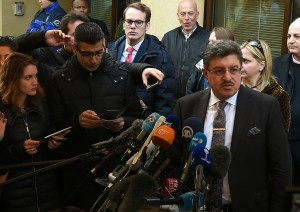
by Layal Abou Rahal with Dave Clark and Fran Blandy in Paris
GENEVA, Switzerland (AFP) — Syria’s warring sides gathered in Geneva Sunday for UN-brokered indirect peace talks as the United States and France warned the Damascus regime against trying to disrupt the fragile ceasefire.
As the fifth anniversary of the violence looms, the main players in the conflict were on Monday to resume negotiations in the latest bid to end bloodshed which has killed more than 270,000 people and displaced millions.
United Nations Syria envoy Staffan de Mistura met representatives of both delegations on Sunday for “informal meetings” ahead of the negotiations.
He has said that the round of Geneva talks would not last more than 10 days.
In Paris, after meeting European allies, US Secretary of State John Kerry hit out at comments by his Syrian counterpart who said talk of removing President Bashar al-Assad would be a “red line” in the talks.
French Foreign Minister Jean-Marc Ayrault went further, calling Walid Muallem’s comments a “provocation” and a “bad sign” in the peace efforts for Syria.
Kerry warned Damascus and its allies Russia and Iran against “testing boundaries” or lessening their compliance with a fragile February 27 truce that has largely held despite the sides trading mutual accusations of violations.
While analysts say much has changed since the last round of indirect talks collapsed in February, Assad’s fate and the holding of elections within 18 months remain huge obstacles.
– ‘Moment of truth’ –
“We will not talk with anyone who wants to discuss the presidency… Bashar al-Assad is a red line,” Muallem said in Damascus on Saturday.
Kerry said the Syrian minister was “clearly trying to disrupt the process… clearly trying to send a message of deterrence to others.
“But the fact is (Assad’s) strongest sponsors Russia and Iran have both adopted… an approach which dictates that there must be a political transition and that we must have a presidential election at some time.”
Kerry urged Russian President Vladimir Putin to bring Damascus into line, saying he should be concerned that Assad had used Muallem “to try and act as a spoiler, to take off the table something that president Putin and Iran had committed to”.
“So this is a moment of truth, a moment where all of us have to be responsible.”
Kerry hailed the fact that the ceasefire had led to a reduction of violence of up to 90 percent, and made possible the delivery of emergency supplies to some 150,000 civilians in besieged areas.
He said the coalition had pushed the Islamic State group out of 20 percent of the territory it held in Syria and that 600 IS fighters had been killed in the last three weeks.
He highlighted the importance of the Geneva process in tackling the unprecedented refugee crisis in Europe, saying that if the ceasefire did not hold “we will be back here next year or even the year after next facing a Middle East with even more refugees, even greater numbers of dead and displaced, even more suffering”.
– Transitional body –
Syrian government negotiator Bashar al-Jaafari arrived Sunday in Geneva, a day after delegates from the main opposition group, the High Negotiations Committee (HNC).
The HNC Sunday pledged to stick with the talks, but reiterated that Assad could play no role in the planned transitional body.
“We have come to discuss a political solution seeking to end the suffering of the Syrian people and we hope that the other party will be as serious as us,” said HNC spokesman Salem al-Meslet, saying the opposition had no intention of “pulling out” of the talks.
The HNC was hoping the talks would begin with a discussion of the transitional body which would be imbued with “all the powers, including those of the president,” he said.
“There will be no role within this body for those who have committed crimes or for Bashar al-Assad.”
The HNC has repeatedly called for Assad’s departure as a prerequisite for any deal, with chief opposition negotiator Mohammad Alloush saying Saturday that the transitional period “should start with the fall, or death, of Bashar al-Assad”.
“It cannot start with the presence of the regime, or the head of this regime still in power.”
In the latest violence on the ground, Al-Qaeda fighters and allied jihadists clashed with a rebel faction known as Division 13 overnight in northwestern Syria after storming its weapons depot, the group said.
The Syrian Observatory for Human Rights monitoring group said at least six combatants were killed, four of them identified as Division 13 fighters.
© 1994-2016 Agence France-Presse








